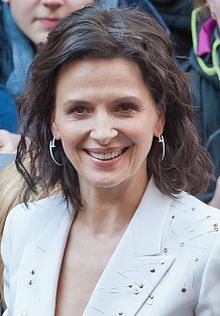Juliette Binoche
| Juliette Binoche | |
|---|---|

Juliette Binoche in 2015
|
|
| Born |
Juliette Stalens Binoche 9 March 1964 Paris, France |
| Other names | "La Binoche" |
| Occupation | Actress, artist, dancer, human rights campaigner |
| Years active | 1983–present |
| Partner(s) | André Halle (1992—1995, 1 son) Benoît Magimel (1998—2003, 1 daughter) Santiago Amigorena (2005—2008) Patrick Muldoon (2003—2005), (2014—present) |
| Children | 2 |
| Parent(s) | Jean-Marie Binoche Monique Stalens |
| Relatives | Marion Stalens (sister) Camille Humeau (half-brother) |
Juliette Binoche (French pronunciation: [ʒyljɛt binɔʃ]; born 9 March 1964) is a French actress, artist and dancer. She has appeared in more than 60 feature films, been recipient of numerous international awards, and has appeared on stage and in movies across the world. Coming from an artistic background, she began taking acting lessons during adolescence. After performing in several stage productions, she began acting in films by auteur directors Jean-Luc Godard (Hail Mary, 1985), Jacques Doillon (Family Life, 1985) and André Téchiné, who made her a star in France with the leading role in his 1985 drama Rendez-vous. Her sensual performance in her English-language debut The Unbearable Lightness of Being (1988), directed by Philip Kaufman, launched her international career.
She sparked the interest of Steven Spielberg, who offered her several parts including a role in Jurassic Park which she declined, choosing instead to join Krzysztof Kieślowski in Three Colors: Blue (1993), a performance for which she won the Venice Film Festival Award for Best Actress and a César. Three years later Binoche gained further acclaim in Anthony Minghella's The English Patient (1996), for which she was awarded an Academy Award and a BAFTA for Best Supporting Actress in addition to the Best Actress Award at the 1997 Berlin International Film Festival. For her performance in Lasse Hallström's romantic comedy Chocolat (2000), Binoche was nominated for an Academy Award for Best Actress.
...
Wikipedia
